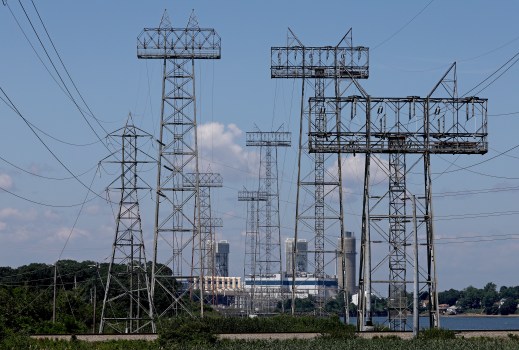Your air conditioner’s electrical rates are rising, so you might wish to switch it off.
This month, Eversource and National Grid, Massachusetts’s two main energy providers, both increased their rates.
National Grid increased its prices from 14.6 to 15.4 cents per kWh, a 5.5% increase, and Eversource increased its rates by more than a cent per kWh, from 13.2 to 14.8 cents per kWh, a 12.3% increase. According to Eversource, rates are established twice a year, at the beginning of August and the beginning of February.
“We estimate that a typical residential customer who uses 600 kilowatt hours per month would see a total bill increase of about $9.85,” an Eversource representative stated.
According to the Massachusetts Executive Office of Energy and Environmental Affairs, only 31% of residential customers are on the Basic Service plan, which is where the rate changes apply. Of these, 50% obtain their supply through municipal aggregation, and roughly 19% come directly from a retail supplier.
William Hinkle, a spokesman for Eversource, stated that this is the situation for Boston and much of Eastern Massachusetts. According to him, local aggregation programs provide electricity to over 80% of the region’s consumers, including nearly the whole city of Boston.
Hinkle stated, “I think it’s important for people to understand if they’re consuming this information. As you’re not receiving that supply from Eversource, it’s very likely that if you live in Eastern Massachusetts, this rate change does not impact your supply rate.”
In a system known as municipal aggregation, a municipality leverages the strength of group purchasing to negotiate cheaper prices from the supplier than would be possible if consumers made their purchases directly from the utility.
According to Newton Power Choice, you continue to be an Eversource customer in such a system. But your electricity is no longer purchased or supplied by Eversource. Consequently, Eversource’s Basic Service rate for the Supply section of your electricity statement is no longer applicable.
Higher summer electricity consumption, continued investments in grid infrastructure and stability, and worldwide natural gas demand and market volatility are the main causes of the hike, according to utilities tracker ElectricityRates.com.
The rate’s increase during a string of temperature spikes is frustrating at least some observers with policy decisions that could have led to the commonwealth’s current predicament, regardless of the actual outcome of what appears on a customer’s final bill.
The electricity costs in Massachusetts are currently among the highest in the nation, and they will soon grow significantly worse. Paul Diego Craney, Executive Director of the Massachusetts Fiscal Alliance, stated that low and middle-income customers are the ones who suffer the most from high energy bills, which operate as taxes.
It’s not happening by chance. Craney went on to say that Governor Maura Healey’s strict and unduly ideological energy agenda and poor legislative policies are to blame.
Beacon Hill’s alternative energy regulations are cited by Craney’s Massachusetts Fiscal Alliance, a nonpartisan group that supports prudent spending and open government, as a direct cause of rising costs.
This government is continuing to push the same seriously misguided policies, and customers are paying the price, Craney said, whether it is offshore wind boondoggles, expensive net zero regulations, or the rejection of dependable and inexpensive energy sources. The ratepayers owe it to Governor Healey and the lawmakers who supported the NetZero by 2050 mandate to reveal the ultimate cost of this demand and the source of funding.
With its proposed Energy Affordability, Independence & Innovation Act, the Healey administration disputes that claim, claiming that it will reduce Basic Service Rates by enough to save energy consumers between $600 million and $780 million over a ten-year period.
Businesses and residents in Massachusetts cannot afford such rises in energy rates. Energy and Environmental Affairs Secretary Rebecca Tepper stated, “We’re working hard to pass this bill as soon as possible because Governor Healey’s energy affordability legislation would specifically prevent this scenario from happening.”
According to an administration fact sheet, the proposed legislation aims to remove obstacles to constructing and acquiring more clean energy and obtaining the cheapest prices, so increasing the state’s power to acquire energy and promoting the development of local resources.
The state aims to accomplish this by substituting the state Department of Energy Resources as the contracting authority for the private utility companies. This will allow DOER to directly conduct solicitations and acquire contracts to purchase clean energy. The Healey administration also claims that since energy production would not be dependent on world events like the conflict in Ukraine, which causes price increases for fossil fuels, it would be flexible.
Lastly, by eliminating a 1982 statute that mandates a statewide ballot initiative to approve new nuclear facilities in the state, the bill opens the door for nuclear energy in Massachusetts.
Chris Van Buskirk, a reporter for the Herald, helped with this story.












